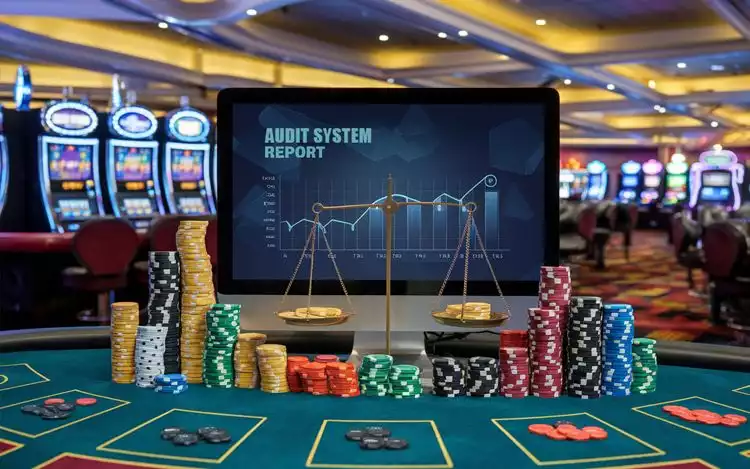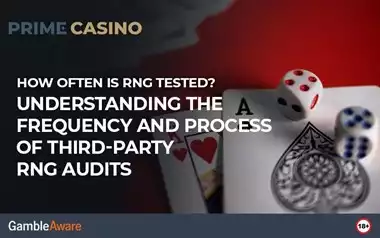Random Number Generators (RNGs) form the foundation of online casino games, ensuring that outcomes remain unpredictable and are always fair. However, with rising skepticism about rigged outcomes, how can players be sure that these generators are trustworthy? The answer lies in rigorous testing and verification methods employed by independent auditors, regulators, and even players themselves.
In this guide, we’ll explore:
- Various verification methods applied to RNGs
- The role of independent certification agencies
- Statistical tests used to identify biases
- How regulators enforce fairness in online gambling
- Practical steps players can take to evaluate RNG reliability
By understanding these aspects, you can confidently choose licensed platforms that prioritise transparency and fairness, ensuring an online casino experience that you simply won’t find anywhere else.

Understanding RNGs in Online Casinos
Before diving into the testing techniques, it's important to grasp what an RNG is and how it operates in online casinos. An RNG is a software algorithm responsible for generating random results used in casino games such as online slots, modern UK roulette, and blackjack. To ensure fair play, these outcomes must be completely unpredictable.
There are two primary types of RNGs: True Random Number Generators (TRNGs) and Pseudo-Random Number Generators (PRNGs). While TRNGs rely on physical processes, PRNGs use mathematical formulas and seed values to create sequences that appear random. Most online casinos use PRNGs because they are efficient and fast. However, they must be tested regularly to ensure they do not produce biased or predictable outcomes.
How RNG Fairness is Tested
Ensuring fairness in RNGs involves multiple verification layers, including independent audits, statistical analyses, regulatory oversight, and player assessments. Each of these elements plays a crucial role in maintaining trust and transparency in online gaming.
Below are five essential techniques used to verify RNG fairness:
1. Independent Auditing and Certification
Reputable online casinos enlist independent testing firms to evaluate and certify their RNGs. These trusted testing agencies conduct rigorous assessments to verify compliance with industry standards:
- eCOGRA – A UK-based agency known for fair gaming certifications (ecogra.org)
- iTech Labs – Specializes in RNG testing for unpredictability and fairness
- GLI (Gaming Laboratories International) – Ensures global compliance with gambling regulations
Audited casinos display certification seals, indicating that their RNGs meet fairness criteria. The UK Gambling Commission (UKGC) mandates independent testing for all licensed operators.
2. Statistical Analysis and Probability Testing
RNG outcomes should conform to expected probability distributions over time. Statistical tests help identify biases that may indicate unfairness. Common fairness tests includes:
- Chi-Square Test – Measures how observed RNG results compare to expected frequencies
- Kolmogorov-Smirnov Test – Analyzes the randomness of result distributions
- Runs Test – Detects patterns in sequences that should be random
- Monobit Test – Assesses balance between zeros and ones in binary RNG sequences
These mathematical methods ensure that game outcomes such as that of the Slingo Rainbow Riches game and Big Piggy Bank slots remain genuinely unpredictable.
3. Continuous RNG Monitoring and Audits
Fairness testing isn't a one-time process. Licensed casinos must subject their RNGs to continuous verification to maintain compliance. Continuous audits work as follows:
- Live data monitoring – Some regulators require real-time tracking of game results.
- Regular re-certification – Casinos must renew their RNG certifications periodically.
- Player complaints & investigations – Disputes may prompt additional fairness reviews.
The UKGC enforces strict guidelines requiring operators to keep detailed logs for transparency.
4. Blockchain and Provably Fair Gaming
Some online casinos leverage blockchain technology to enhance transparency in RNG outcomes. Provably fair gaming allows players to verify the fairness of game results independently. RNG verification are enhanced by blockchain by:
- Smart contracts store game results securely.
- Hashing algorithms enable real-time verification of results.
- Immutable records prevent casinos from manipulating past outcomes.
Although not yet widespread, blockchain-based fairness testing is gaining traction in the industry.

5. Player-Level RNG Testing Techniques
Players can also test RNG fairness on their own by tracking results and using basic statistical methods. Depending on the level of difficulty, these techniques can range from simple observations to more technical analysis.
Beginner (Easy to Execute)
- Testing free versions first – Playing demo games helps detect potential pattern biases without financial risk.
- Engaging with player communities – Sharing experiences in forums can highlight irregularities others have noticed.
- Opting for certified casinos – Choosing UKGC-licensed platforms ensures regulatory oversight without requiring technical knowledge.
Intermediate (Requires Some Effort & Basic Understanding)
- Recording large sample sizes – Tracking thousands of spins or hands provides data for fairness evaluation.
- Comparing results to expected probabilities – Checking if game outcomes align with theoretical odds requires basic probability knowledge.
Advanced (More Technical & Requires Tools)
- Applying the Monobit Test – Ensuring a balanced ratio of zeros and ones in RNG binary sequences demands statistical understanding. A study titled "Gaming Self-Contained Provably Fair Smart Contract Casinos" confirms its effectiveness in verifying randomness.
- Using provably fair systems – Verifying cryptographic fairness mechanisms requires knowledge of blockchain technology, as outlined in the abovementioned study.
While not as precise as lab testing, these techniques offer players an extra layer of confidence when navigating the world of online casino games.
Wrapping Up RNG Fairness Testing
Through independent audits, statistical analysis, continuous monitoring, and even blockchain technology, responsible UK casinos can ensure their RNGs remain fair and transparent. Players also have tools at their disposal to verify game fairness, from tracking results to leveraging provably fair gaming platforms. However, understanding RNG testing is only part of the equation—player awareness plays a crucial role in making informed gaming choices.
As Michael Pollock, a well-known casino industry expert, said, "Fairness and transparency are the bedrock principles of a successful gaming industry. Without them, trust is eroded, and the entire system falters." This quote underscores the importance of fairness and transparency in maintaining trust and integrity within the casino industry.
By combining advanced testing methods with informed player choices, the industry can create a fairer and more trustworthy gaming environment for everyone.
Player Education and Awareness
To empower players, various organizations provide valuable resources on RNG fairness and testing. Websites like the International Centre for Responsible Gaming (ICRG) offer educational materials that help players understand their rights and the importance of selecting certified casinos.
Engaging with player advocacy groups also fosters greater transparency in the industry. These groups advocate for responsible gambling, promote fairness testing awareness, and encourage regulators to uphold high standards.
How to Find Reliable Information
- Regulatory Websites – The UKGC, Malta Gaming Authority, and other regulators publish lists of licensed casinos.
- Casino Review Sites – Platforms like AskGamblers and ThePogg provide unbiased insights on casino fairness.
- Casino Terms and Conditions – Checking a casino’s licensing and fairness policies can reveal its transparency commitments.
- Gambling Forums and Communities – Online discussions, such as those on Casinomeister and Reddit, help players share insights and detect unfair practices.

The Verdict on RNG Testing
Ensuring RNG fairness is fundamental to maintaining trust in online gaming. By understanding the rigorous testing procedures, independent audits, and player-level verification techniques, players can confidently engage with fair and transparent casino platforms.
Key Takeaways:
- Independent audits and certifications validate game integrity.
- Mathematical fairness tests identify biases in RNG results.
- Regulatory oversight ensures compliance with gambling laws.
- Blockchain-based systems offer emerging transparency solutions.
- Players can take active steps to assess fairness themselves.
By selecting licensed and tested gaming platforms, players can enjoy online gaming with confidence. Always play responsibly and stay informed about fairness standards. Sign up at Prime Casino. We’re not just another online casino - we’re the online casino.








